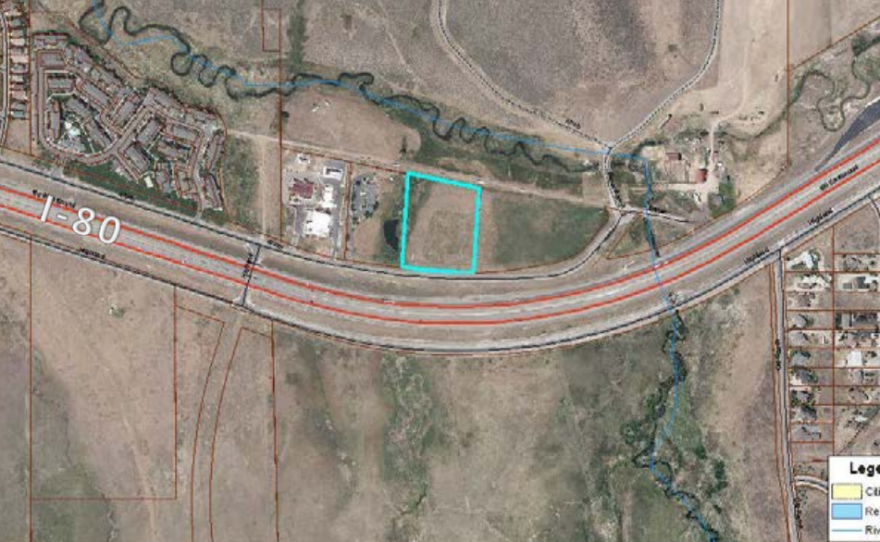The Summit County council did not come to a decision about the proposed Lincoln Station development on Bitner Road.
The council continued the item in order to nail down details in a proposed Development Agreement. Council members say they want to ensure that affordable units in the project stay that way.
Meanwhile, most of the citizens speaking in a public hearing supported the plan.
The council is being asked to rezone a four-acre parcel east of the Bitner Road Fire Station. The current Rural Residential zoning would allow one unit per 20 acres.
Develop Vince Criscione is asking to create 78 residential units, with 52 of those planned as deed-restricted affordable housing, and over 5,000 square feet of commercial.
A major question for the council is whether the project meets Section 2.3 of the Snyderville Code—which says the county can’t create any new entitlements unless the project meets a compelling, countervailing public need.
The public hearing drew about ten speakers, almost all in favor of the opportunity it provides for employee housing. Marion Crosby said Lincoln Station is a big step in the right direction. She said the parcel is located in the right place to access public transit and to connect to Kimball Junction.
“The developer by providing a host of community benefits at no cost to Summit County or our tax bills. (It) includes three times the amount of the required minimum of affordable housing units, basin recreation trails connection along Bittner road, and a Summit County transit stop.” Crosby said “Finally, in considering appropriate locations for higher and affordable density with easy access to a frontage road and public transit, without jumping on a freeway clogged with semi’s and oil tankers. A rezone of this parcel makes a lot of sense.”
Fred Eckstein said although the plan would up zone the parcel to a much greater density, in the end it won’t have a negative impact on the Basin’s carbon footprint.
“If you look at the big picture, those future 78 residents they’re already up here. They’re commuting from Salt Lake or other places on a daily basis burning a lot of gas.” Eckstein continued, “If they don’t have to do that, if they can live near by and possibly even take public transportation the argument could be made that this project actually reduces the overall carbon footprint of the community.”
John Digman said he hopes the project will be approved soon.
“I’ve owned a business here for 20 years and I’ve only had one employee live in Park City over those 20 years. Hats off to this developer, because I don’t see how this can be affordable.” Digman said “I think if we put too many restrictions on the development to make it non-affordable for him to make a profit, we’re not going to get this type of development in our community; which is so badly needed.”
One speaker, Vanessa Hartley, said she was concerned about the project’s impact on the environment—including light, noise and parking overflowing down the frontage road.
Council member Chris Robinson said they want to ensure that the project has affordable housing for 60 years. Given that, they spent a lot of time going over details about how the units will be affected by subsequent sales, foreclosure, property transfers or the approved density falling to another developer.
The council has been interested in a so-called waterfall provision, which would give priority to tenants who work in the county. But applicant Criscione said that under the tax credits and federal HUD financing he’s seeking, he can’t implement that.
He said he wants to serve local employees too, but he doesn’t think a waterfall provision is necessary.
Criscione said, “We polled five or six different projects and none of the people that live there are living there and working down in Salt Lake. That’s what low-income people generally don’t do (…) they’re not living up here and commuting down there, generally speaking. The marketing plan targets the people that we want to live here.”
Also speaking in the public hearing was his wife Teresa, who confessed she’s a little frustrated and “worked up”. She said they’ve been working on the plan for seven years and recognized the need for affordable housing before the general community recognized it.
“Can we just get a little real about this? This is 67% affordable, and even the ones that are not affordable are going to be low-end market rate apartments. These are not Deer Valley condos, or some expensive ski-in-ski-out. We are building them, so people can afford it. So some of our friends kids might actually be able to, as young professionals, be able to afford rent and save for a house so they can buy.” Criscione said, “So this whole thing, to me, meets countervailing interest. Even though I know you guys are hung up on the affordable 2.3 and I get that. By any measure we’ve gone so far beyond so, I’m just asking for a little reasonableness.”
Meanwhile, county council member Doug Clyde said they believe Lincoln Station is in the right spot. But, he said they just want to make sure the project doesn’t unravel.
“If it unravels it will become for sale units, that will be bedroom communities for Salt Lake. That’s our major concern. We just saw, for example, Park City had to go in and buy a block of condos because somebody defaulted on them. It was their affordable housing obligation and they defaulted on them. Park City’s only remedy was to go and buy them.” Clyde continued, “That’s not a remedy that’s possible for us. We don’t have deep enough pockets to remedy this situation by stepping in and buying the units. We’ll absolutely never give up that option, but the probability of us coming to the public and saying ‘ya know, just another 40-50 million dollars and we’ll get this solved,’ is pretty unlikely.”






